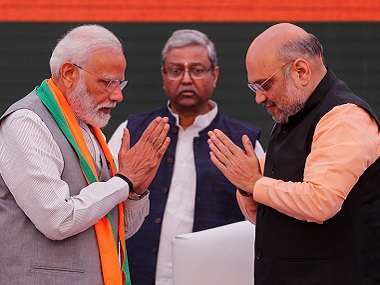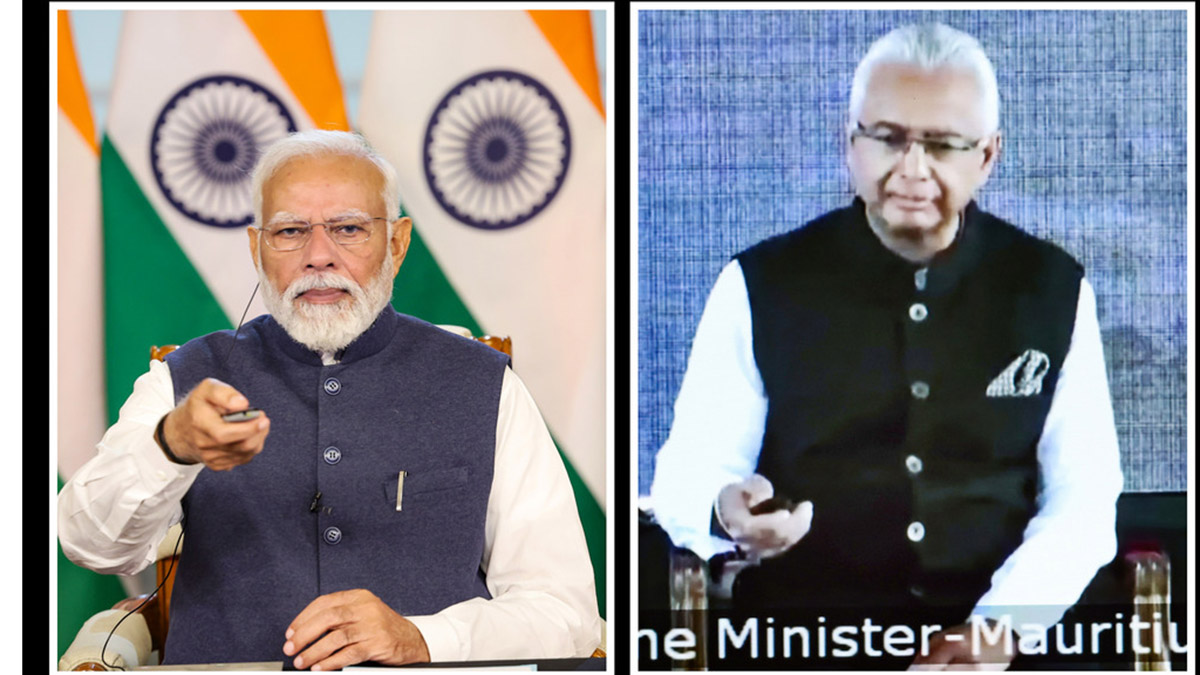These elections, I voted for the first time. I voted because I believe that the ‘idea of India’ is under threat. I came across the phrase for the first time, almost two decades ago, when I read Sunil Khilnani’s terrific book of the same name.
Till five years ago, ‘liberal’ wasn’t a word one used consciously. In the last five years the word has been reinvented as a punching-bag category that “bhakts” could vilify.
Hindutva is an acquired oppositional identity; it’s oppositional because like any fundamentalist position, it is, in essence, an anti-position: anti-liberal, anti-Nehru, anti-Dalit and anti-Muslim. The only positives that can be added to this, the majoritarian religion (Hinduism) and nation (India), already exist.
Hindu India was always prejudiced; Hindutva Bharat simply tapped into and exploited these latent tendencies. This is my argument.
*
Do the people of India feel that the idea of India is under threat? Certainly not.
It’s the reason why when Mamata Banerjee comes to Delhi and screams: ‘Modi hatao, desh bachao’, the speech comes across as a non sequitur. When Arvind Kejriwal says: “This election is about making sure that Modi and Shah do not return to power, no matter what. It’s about saving India’, it fails to influence the voter.
The very idea of the Mahagathbandan, a united Opposition based on a positive premise — to save the idea of a plural secular democratic India — comes across as a negative one to the average voter, who asks: “But why do you want to remove Modi?” In the perception battle, Narendra Modi is not power hungry, the Opposition is.
India, both in class and caste, is a deeply divided country; it was always so. The middle-class savarna voter is inherently prejudiced. Dalits, Muslims and farmers’ issues never had any resonance with him.
We live in segregated cities. In North Indian small towns, Muslims live in Chowk and the Hindus in Civil Lines. We take this for granted.
In a Dehradun bar, a girl from Welham asks me a question. She has a Muslim boyfriend but they’re thinking of breaking up. It’s too complicated, for both of them. “Do you think my parents will have less of a problem if I marry a Christian?” she wonders aloud.
Way before the BJP became a force to reckon with, a Christian friend, while driving through crummy West Uttar Pradesh small towns, made a throwaway remark about Muslims lacking a basic sense of hygiene.
A Hindu boy, getting a haircut and shave from a Muslim barber, asks him to not shave off the beard completely. The barber asks: ‘How much should I trim?’ The Hindu boy says: ‘As long as it’s not a mulla cut’. The barber is taken aback, then recovers and says gently: “Nowadays everyone keeps a beard. It’s the fashion.”
An engineer, also a rapper, is full of bile against Dalits. Anti-Dalit sentiment has always existed in India society; it’s what the caste system is based on. It was exacerbated after the Mandal Commission Report. Indians still lower their voice when they say, referring to someone: “He’s an SC I’ve heard. That’s why he doesn’t write his surname.” Dalits themselves want to keep it quiet.
We are, to twist a Millennial phrase, old soul bigots.
*
I’ve been asking everyone I meet — none of them are raging “bhakts” — why they are voting for Modi. Modi’s fan base goes beyond pure “bhakts”. They like Modi, that’s for sure, but none of them feel that the idea of India is under threat. When I talk to them about the atrocities being committed — a Muslim man sitting in slush, being forced to eat pork; Dalits being flogged; farmers’ woes not being addressed, their eyes glaze over.
This applies to the kirana store owner as much as it does to the girl in the short black dress studying to be a criminal lawyer. What’s happening to Dalits and Muslims leaves them cold. They’re just not interested. Hindus ‘never ate’ beef and so Muslims being killed for transporting cattle is not an issue that affects them. Nor does: how did demonetisation affect the poor Muslim in Uttar Pradesh and rob him of his livelihood? There’s zero empathy. Any empathy they have is reserved for something imaginary: the fictional genocide of Hindus, apparently ongoing in several countries around the world.
The more pressing concern is: What’s happening in the IPL match at one in the morning? Is CSK winning? Even in cricket — our other religion — we have poor taste.
Yogendra Yadav said in a television interview that the narrative against the BJP cannot be changed by a deracinated English-speaking elite but by a charismatic leader who speaks the people’s language.
I played Kanhaiya Kumar’s speech on You Tube to Nitesh, an unemployed Bihari youth, a former Uber Eats rider, now out of work. His best friend is an Ansari, a Muslim embroiderer, also out of work.
Nitesh and Ansari are Modi supporters. The fact of their unemployment does not rankle them. Nitesh hails from the same part of Bihar as Kanhaiya. Ansari is from Chhapra. I am a fan of Kanhaiya and I tried to make one out of Nitesh. I tried to change the narrative, in not just his language, but his dialect. He walked off after five minutes of watching Kanhaiya, calling him a ‘ch***ya’.
Nitesh is not on WhatsApp, but he watches Hindi news channels 24/7. They are full of glowing admiration for Modi. So is Nitesh.
He was thrilled when Modi announced the Rs 6,000-a-year direct transfer scheme for farmers. He turned to Ansari and said: “Chalo yaar Ansari, let’s go back to the village and get registered as farmers. Arre kuch to ayega jeb main.”
*
The idea of a secular modern India was always a Kantian “ought” and it served us well. But “ought” does not imply “is” forever. The lack of empathy on the part of the non-tax paying Hindu majority for the minorities, tribal Christians and the downtrodden is entrenched. It has been so even before Modi and the BJP worked it to their advantage. The hardware, the phone, was already on the table, all the BJP had to do was change the SIM card.
Let us not blame only Modi and Shah. They did not invent this hatred. They activated it. To that extent they are responsible. The genie is out of the bag and will be difficult to bottle. Lip-service has its advantages in a democracy. And yet, lip-service doesn’t change the truth. Lip-service is also hypocrisy.
A majoritarian savarna Hindu population does not for a moment believe that the idea of India is under fire. On the contrary, they believe that the idea of India is on a roll.
It’s possible that the Congress will win or a coalition government will take centre-stage. But this is not because the people have voted to save the idea of India. It will be for local reasons, regional issues, immediate agrarian distress (the selling price of sugarcane), arithmetic.
The majoritarian Indian voter is a veteran of democracy. She knows how to extract benefits by changing governments regularly, how to scare and spur the government into some kind of action, especially when elections are round the corner. She uses that Damocles sword for personal gain. But she’s not doing it to save the idea of India.
Even the Congress is continuing the good work of the BJP in the states it has won, like Rajasthan and Madhya Pradesh. ‘Cattle smugglers’ are being arrested, more money is being channelled into gaushalas, astrologers are being given jobs in government hospitals. This is the majoritarian agenda. This is what people want. Hindu majoritarianism is here to stay because it is who we are, no matter who runs the government.
We are not the Irish who’d moved on in a generation. Church attendance collapsed, gay marriage was legalised and a half-Indian gay man was appointed head of state. Patriotism and hyper-nationalism passed into the realm of the uncool, the tacky, something beloved of Third World teenagers and nutty Americans. The new generation in India does not leave anything behind. It carries the past with it.
Modi is an instigator in the classic mould. In a country fascinated by spiritual gurus, he’s taken on that role as well. His ‘discourses’ combine the religious with the political. But no matter how seductive his charisma might be, he couldn’t have pulled off what he has, if the bulk of Indians were not what they are: brutal, insensitive, prejudiced, instinctual, money-minded, religious, selfish, anti-intellectual. They used free data not to discover the world but the hatred within (and pornography).
The Photoshopped anti-Nehru fakery on WhatsApp University couldn’t have been able to lay down roots unless the soil was already amenable. The BJP and the RSS only added some fertiliser.
In such conditions, misanthropy cannot be avoided. It’s hard to like one’s fellow citizens. By doing this, one plays into the Hindu Right’s polarising agenda. The BJP wins again. That is the depressing truth.
*
Meanwhile, it’s not unlikely that at least some in the minority community will start following the Hindu Pied Piper’s agenda. It’s a version of: if–you-can’t-beat-em-join-em, but a little more complicated.
In her book Keeping the Peace: Spatial Differences in Hindu Muslim Violence in Gujarat in 2002 (CUP), Raheel Dhattiwala hints at Muslims gradually accepting “the presence of a national identity overlapping a gradually subsiding religious identity.” She writes: “Respondents blamed members of their own religion — and indirectly, their own selves — for the new found ‘compromise’ in favour of the BJP.
“A Muslim supporter of the BJP, Shaukat, believed that ‘Hindus hate us because we behave uncouthly and are illiterate’; another Muslim BJP supporter, Aijaz, similarly attributed anti-Muslim sentiment to ‘our own illiteracy and jahalat (darkness and ignorance)’.”
Another way of looking at this is: first comes the Stockholm syndrome, which causes hostages to develop a psychological alliance with their captors as a survival strategy during captivity. This then transitions to the Helsinki syndrome in which a person being held captive begins to identify with and grow sympathetic to his or her captor, simultaneously becoming unsympathetic towards the police or other authorities.
The majority is already with Modi. Once the Muslim and the Dalit quit eating beef and fall in love with him, the dream of the Hindu Rashtra will have been fully realised, albeit minus the tricolour fluttering in Lahore.
Perhaps this why Ansari, the embroiderer, went with Nitesh, the Uber Eats rider, to see the Ram Lila every night. Perhaps this is why they hate Kanhaiya. Perhaps this is why Ansari has erased his Muslim name and prefers it when people call him, simply, ‘Jharkandi’.
I dread the day I’ll spot him riding pillion on a kanwariya’s motorcycle. Only a lynching might spare him that fate.
The writer is the author of Eunuch Park and the editor of House Spirit: Drinking in India


)




)
)
)
)
)
)
)
)